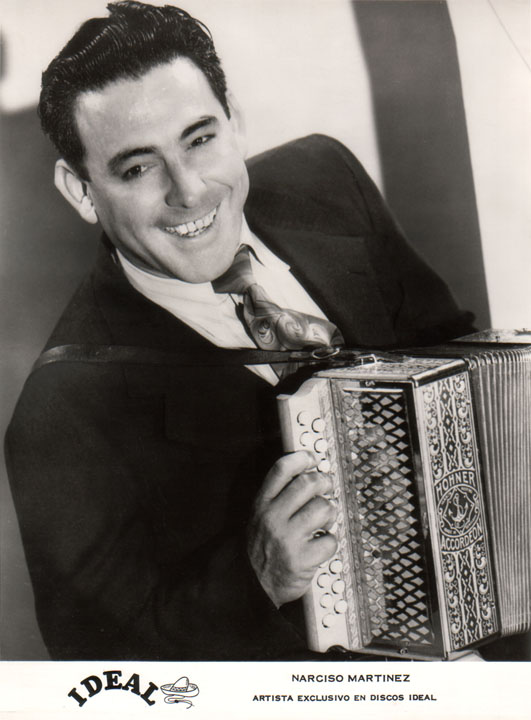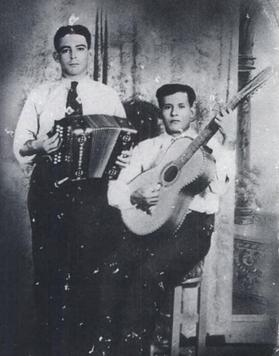
Narciso Martínez was born in 1911 in Reynosa, Mexico. His family migrated to La Paloma, Texas the same year in search of work in the Rio Grande Valley. His family often moved, and Martínez did not receive a formal education. He often found himself listening to orquestas típicas, which were regional musical groups that consisted of violins, flutes, bass, and guitars but he was much more infatuated with the accordion, which his brother also played.

In 1928, Martínez got married to his wife (who he later had four kids with) and also took up the accordion. He completely taught himself, learning techniques and getting inspiration from the Czech and German immigrants in the area, he was soon able to perform at parties and dances.
In 1930, Narciso Martínez purchased his first new accordion, a Hohner, which was a one-row button model. Five years later, in 1935, he switched from the one-row button to a versatile two-row button accordion. Around this time, he also began performing with Santiago Almeida (born in Skidmore, Texas) who was a bajo sexto (twelve-stringed bass guitar) player. The two became a notable duo and established the Tejano Conjunto sound; Martínez focused on the right-side melody and treble notes and Almeida focused on the left-side bass notes. Martínez had very successful recording sessions, sometimes recording up to 20 tracks in one session!

Additional Work and Contributions

Martínez popularity grew beyond the Mexican American community, but he had additional work that was recorded under different pseudonyms for different markets. His record label, Bluebird, believed that his work would not sell elsewhere as is, so he had to record under a different name. For example, in order to sell in Louisiana, he recorded under the name ‘Lousiana Pete’
for Bluebird’s Cajun series. Martínez had to rebrand his conjunto music to cater to the market. His original conjunto song, “El Delfo” was rebranded to “Delta Waltz” for the Cajun market. In northeast Texas, he was published as either “Polish Joe” or “Polski Kwartet.”
After World War II, Tejano artists were struggling to have their music heard because labels were not producing their records. There was a rise of independent, Mexican-American labels, such as Ideal Records, which was founded by Armando Marroquín and Paco Betancourt. Ideal’s popularity skyrocketed and it quickly became an important part of the Tejano music industry. Martínez was one of the first artists under Ideal Records, with his most notable contribution being the popularization of the accordion in Tejano music. He also would record with other artists signed to Ideal Records, such as Carmen Y Laura, Las Hermanas Mendoza, María and Juanita, and Lydia Mendoza.
Narciso Martínez is known today as the father of conjunto music and was given the nickname “El Huracán del Valle” (the Hurricane of the Valley) because of his fast and powerful accordion playing. In 1983, Martínez was awarded a National Heritage Fellowship by the National Endowment for the Arts, which is the United States’ highest honor in folk and traditional arts.
Songs
This was the first song that Narciso Martínez and Santiago Almeida recorded together.
This is the song, “Ma Fiancée,” which was recorded by Martínez under the pseudonym ‘Lousiana Pete.’
This is the song, “El Relámpago,” which I feel shows why Narciso Martínez was given the nickname “El Huracán del Valle.”
Citations
Gurza, Agustin. “Strachwitz Frontera Collection Artist Biography: Narciso Martínez.” Strachwitz Frontera Collection of Mexican and Mexican American Recordings, 5 June 2015, https://frontera.library.ucla.edu/blog/2015/06/artist-biography-narciso-mart%C3%ADnez.
Acosta, Teresa Palomo. “Martínez, Narciso (1911–1992).” TSHA, 1 Nov. 1995, https://www.tshaonline.org/handbook/entries/martinez-narciso.
Harris, Craig. “Narciso Martínez Biography, Songs, & Albums.” AllMusic, https://www.allmusic.com/artist/narciso-mart%C3%ADnez-mn0000371917/biography.
“Ma Fiancee” – Louisiana Pete. http://earlycajunmusic.blogspot.com/2014/09/ma-fiancee-louisiana-pete.html.
“Narciso Martínez.” National Endowment for the Arts, https://www.arts.gov/honors/heritage/narciso-martinez.
